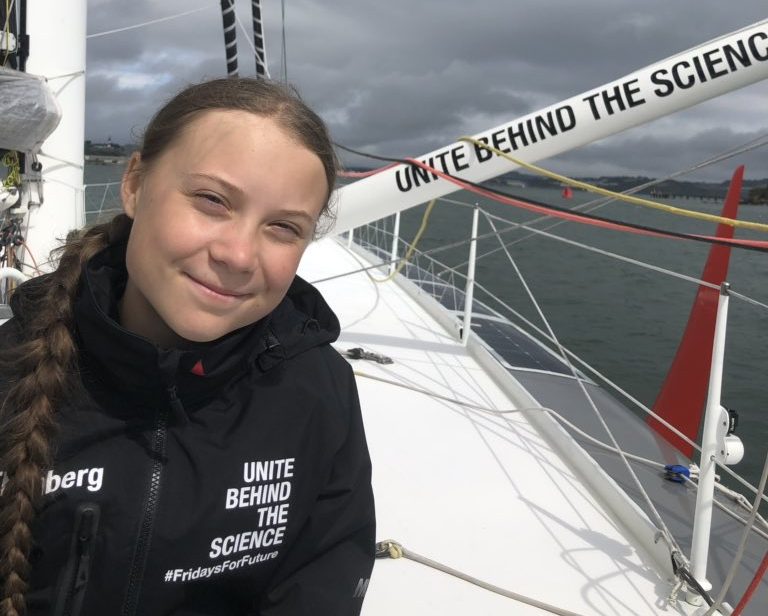I have a carbon conundrum.
The planet’s scientists told us just last month – again – that we are in a time of climate reckoning. It is “code red for humanity.” Every molecule of carbon dioxide we emit into the atmosphere is too much.
You may unsubscribe from any of our newsletters at any time.
I’ve spent the past two decades chronicling this story as a journalist. And that’s meant doing research with scientists around the world, bearing witness to their findings so I could write about them. It’s meant a lot of travel.
Most recently, I turned the research from my book Sea Sick into a play, with help from artistic directors Franco Boni and Ravi Jain. So I’ve been touring that around the world too, explaining the dangers of carbon build-up in the atmosphere and ocean.
We took a travel pause during the COVID-19 pandemic, like everybody else. But now the world is opening up once more and, like many of us, I’m booked to start taking flights again. For me, that starts with a trip to Ireland next month.
Of course, my theatre team and I offset all our travel carbon, typically through the Ocean Foundation, which plants sea grasses to create ocean habitat and suck a travel-equivalent amount of carbon back out of the air.
But is it enough?
I’m not the only one who’s wondering what travel can be justified. Globally, scrutiny over spending carbon is getting more and more intense.
A lot of it centres on criticizing anybody who flies, a phenomenon that’s been dubbed “flight shaming.” The 18-year-old Swedish climate crusader Greta Thunberg has famously refused to travel by plane, citing carbon emissions. In 2019, to get to New York on her way to an international climate conference, she took a 15-day renewable-energy yacht trip across the Atlantic Ocean. A flight from Stockholm would have taken eight hours each way and spent nearly a tonne of carbon.
But even that was not carbon-righteous enough for some. In order to return the boat to Europe after her trip, a couple of people had to fly to New York. An accusing German newspaper calculated that it therefore cost more carbon for Thunberg to go by solar-and-wind-powered yacht than if she had flown.
But the shaming doesn’t stop at aviation. In some circles, it centres on food: If you’re still eating meat, you’re dooming the planet. And if you’re not eating meat, but still eating dairy and eggs, you’re just not doing enough. And if you’re full-on vegan but not eating organic vegan, how come? And if you’re organic vegan but not exclusively local, organic vegan, how can you even look at yourself in the mirror?
The bar for being carbon-virtuous keeps getting higher. A note recently hit my Facebook feed from someone announcing they were giving up computers because of the carbon load involved in making electronics. A young relative who came for dinner recently – My god, we ate salmon! – was upset because a teacher had told her that lithium-ion batteries used in electric cars were taking a terrible toll on the environment. Until then, she’d thought that driving an electric car was environmentally defensible. Now, she wasn’t sure.
Whew.
On one hand, it’s encouraging that knowledge is growing about the carbon-destabilized world we’ve made. A couple of decades ago when I started reporting on climate heating, we weren’t having these conversations.
On the other hand, the conversation feels paralyzing. Often triumphal. It’s like a collective narrowing of the eyes as we assess not only our own carbon purity, but that of everyone else.
But can we take a deep breath? It seems to me that this greener-than-thou mindset is not going to get us where we need to go. While billions of us stayed home during the pandemic, curtailing much of our personal carbon use, emissions fell by seven percent. That’s all.
That tells us that most of the carbon damaging our planet comes from the vast systems we’ve put in place to run the global economy rather than from individual actions. Changing those systems will take wide and deep changes to policy, something that no single person’s food and travel choices can accomplish, no matter how worthy.
How to move forward?
One idea is to let go of the conviction that the problem stems from your personal choices and that your choices alone can solve it.
Katharine Hayhoe, a Canadian climate scientist who works at The Nature Conservancy in the United States, advocates using our voices to press for policy change. She points out in a recent webinar that those who profit most from the current carbon system have an ulterior motive in trying to convince us that it’s our fault. That lets them continue “on their merry way” while we obsess about what we’re doing.
More on Broadview:
- She felt disconnected from Christ. Outdoor church brought her back.
- How Indigenous burning practices can help stop destructive wildfires
- As more U.S. states legalize composting humans, some Catholics aren’t digging it
Alexis Shotwell, a philosopher at Carleton University, suggests forgoing the urge to succumb to the politics of despair. Instead open yourself up to surprise. We are all entangled in this dreadful danger. Together, we can work to make the world we want. She calls that “staying with the trouble we’re in.”
“Aiming at individual purity can produce a seemingly satisfying self-righteousness in the scant moments we achieve it, but since it is ultimately impossible, aiming for purity will always disappoint,” she writes in her book Against Purity: Living Ethically in Compromised Times.
Kathryn Norlock, a philosopher at Trent University, has an even more radical prescription for our cranky age: forgiveness.
“Since we are all guilty, and we are, the starting place should be, first of all, forgiving each other the fact that we are all guilty,” she says, adding: “Forgiveness is a commitment to deal with the offender, and sometimes the offender is yourself.”
Even myself? Flying to perform a play about the evils of carbon?
Yes, says Norlock. If you are doing it because you have hope that it could change hearts and minds, then take flight.
It’s a tricky dance. Mind your own choices but strive to repair the world. Let go of absolutism and shame. Embrace the messiness of the human condition. Even take a flight if you feel you must. But don’t expect any of it to be easy.
***
Alanna Mitchell is a journalist, author and playwright living in Toronto.














